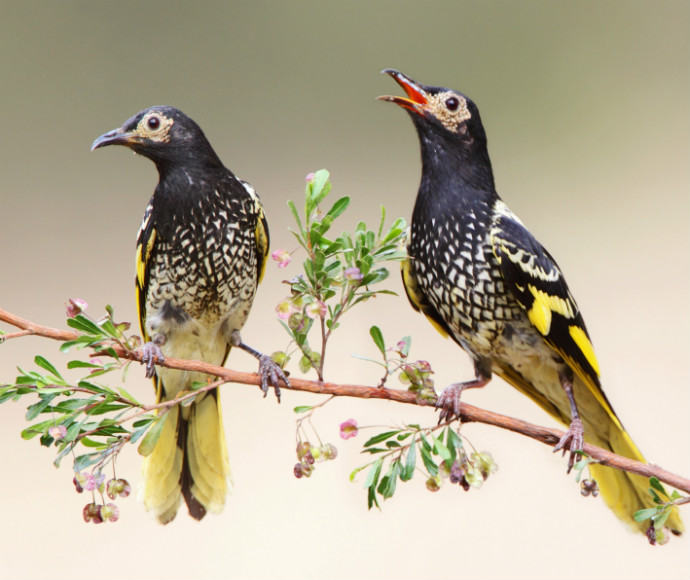Wild success for regent honeyeater breeding program
The successful hatching of a trio of chicks is great news for a program releasing zoo-bred regent honeyeaters to integrate and breed with wild populations of the rare songbird.
The chicks are the first confirmed zoo-wild offspring from the NSW regent honeyeater recovery program, which released 14 zoo-bred birds in November during the spring breeding season in the Greater Blue Mountains region.
The hatching comes 2 years after the mother, a zoo-bred bird tagged ‘RMPP’, was released into the Tomalpin Woodlands in the Lower Hunter Valley.
Since that time, RMPP has flown more than 134 km west to Capertee National Park, where she and a wild male saw 2 of their chicks fledge last spring. The fledglings were last sighted at the end of November and it is hoped they have joined the wild flock of birds. RMBO, another zoo-bred female released along with RMPP in October 2021, was spotted in November with a wild-born partner at a second NSW breeding site in the Upper Hunter.
RMBO hatched and raised a chick with a zoo-bred male in the Tomalpin Woodlands after their release in 2021 – the first zoo-bred regent honeyeaters to successfully breed in the wild in New South Wales.
A third zoo-bred female, ORKM, also paired with a wild male at another location in the Capertee Valley. She was seen twice before moving on, away from the monitoring team’s survey sites.
This year’s spring breeding event of the critically endangered regent honeyeater is the largest in Capertee National Park and surrounds since 2017, with more than a dozen nests and at least 16 fledglings accounted for.
With as few as 250 to 300 regent honeyeaters estimated to remain in the wild, every successful breeding event is critical.
The regent honeyeater breeding program is a conservation partnership between the NSW’s Government’s Saving our Species program, Taronga Conservation Society Australia and BirdLife Australia.
The program has seen the release of 140 zoo-bred birds in New South Wales.
All sights of regent honeyeaters should be reported to BirdLife Australia at [email protected] or fill out the form online.
Quote from Parliamentary Secretary for Climate Change and the Environment Trish Doyle:
'It is exciting news that we have the first confirmed fledglings from a pairing of zoo-bred and wild regent honeyeaters.
'With such low numbers of these magnificent birds remaining in the wild, every successful breeding event and each fledgling gives us hope we have taken another step toward saving this critically endangered species.
'It’s wonderful to know the Greater Blue Mountains region is home to this critically endangered bird and we are committed to conserving its habitat.'
Quote from BirdLife Australia’s Regent Honeyeater Recovery Coordinator Mick Roderick:
'To see 3 zoo-bred females paired with wild males this spring, from 2 separate releases in the Tomalpin Woodlands is just so incredibly pleasing, especially when one of them successfully fledged two chicks.
'It is entirely possible that the male birds would have gone unpaired, given the male bias in the wild population; these are the exact results we are after in the zoo-bred release program.'
Quote from Taronga Regent Honeyeater keeper Kara Stevens:
'Here at Taronga we put so much work into ensuring we are breeding robust and healthy regent honeyeaters and that they are fit for release into the wild. This includes selecting the right birds to release.
'It is therefore so rewarding to hear of successful pairings of zoo-bred birds with wild birds. Knowing that these birds are adding new offspring to an incredibly endangered wild population is so special and the reason why we do what we do.'
Quote from Dr Kim Maute, NSW Government’s Saving Our Species principal ecologist:
'The regent honeyeater is one of Australia’s rarest birds and has few breeding areas left.
'That is why intact forest and grassy woodlands that can support a successful breeding event need to be protected and restored.'
